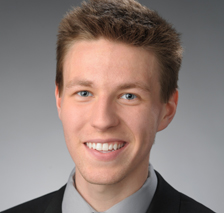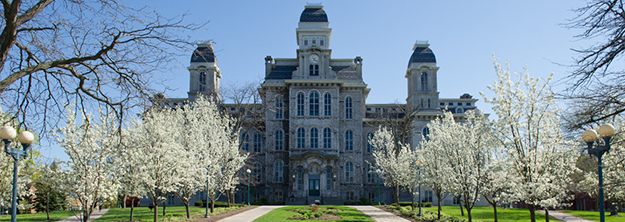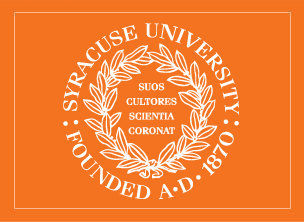
Robert Swanda ’16
Robert Swanda, a double major in nutrition science in Falk College and biology in the College of Arts and Sciences was named a 2016 Syracuse University Scholar, the highest undergraduate academic honor the University bestows. He is also a student in the Renee Crown Honors Program.
Tell us about the three separate honors thesis projects you have completed.
My three research projects throughout my time as an undergraduate have allowed me to explore scientific questions by using proteomic techniques to understand enzyme kinetics, auditing tools to understand obesity related to environmental influence, and gas chromatography mass spectrophotometry and blood sampling to examine environmental influence over rapid evolutionary changes in metabolism. During my time at Syracuse University, my independent research experiences have solidified my ambition to run a research lab of my own at an academic institution or in industry to bring scientific breakthroughs to my community.
You’ve been involved with the Smart Mentoring Program through the Office of Engagement Programs since your freshman year. What has your approach been?
As I worked with students ages 10-14, I began to notice a large gap in their understanding around critical issues such as race, religion and interpersonal conflict. To help them, Fareya Zubair (ESF ’16) and I took a scientific approach, and read psychology journals on the development of empathy. This work later evolved into Empathy Matters, an eight-week mentoring program Fareya and I cofounded for students ages 7-8 to develop their compassion, leadership and confidence skills, while tying all lessons back to empathy. I hope to expand the Empathy Matters program beyond Syracuse.
What do you plan to do next year?
I will move into a Ph.D. program at Cornell University in biomedical science and physiology.
And what are your plans for a future career?
I plan to use my background in ecology, physiology and nutrition to work on large-scale social and ecosystem-based health problems. My transdisciplinary training at SU have helped to put me in a good position in an emerging field that seeks to integrate public and ecosystem health.





